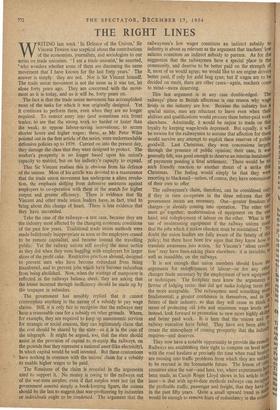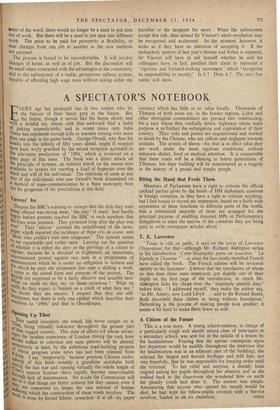THE RIGHT LINES
WRITING last week ' In Defence of the Unions,' Sir Vincent Tewson was sceptical about the contributions of the economists, journalists, and sociologists to our series on trade unionism. ' I am a trade unionist,' he asserted, ' who wonders whether some of them are discussing the same movement that I have known for the last forty years.' The answer is simply : they are not. Nor is Sir Vincent himself. The trade union movement is not the same as it was ten, let ' alone forty years ago.. They are concerned with the move- ment as it is today, and as it will be, forty years on.
The fact is that the trade union movement has accomplished most of the tasks for which it was originally designed. Yet it continues to perform them, even when they are no longer required. To restrict entry into (and sometimes exit from) trades; to see that the strong work no harder or faster than the weak; to oppose labour-saving innovations; to secure shorter hours and higher wages: these, as Mr. Peter Wiles pointed out in the first article of the series, were understandable defensive policies up to 1939. Carried on into the present day, they damage the class that they were designed to protect. The worker's prosperity is no longer based upon his union's capacity to restrict, but on his industry's capacity to expand.
That Sir Vincent realises this is obvious from his defence of the unions. Most of his article was devoted to a reassurance that the trade union movement has undergone a silent revolt'• Lion, the emphasis shifting from defensive measures against employers to co-operation with them in the search for higher output and greater efficiency. There is evidence that Sir Vincent and other trade union leaders have, in fact, tried to bring about this change of heart. There is less evidence that they haVe succeeded.
Take the case of the railways—a test case, because they are the industry most affected by the changing economic conditions of the past few years. Traditional trade union methods were • made ludictously inappropriate as soon as the employers ceased to be remote capitalist, and became instead the travelling public. Yet the railway unions still employ the same tactics as they did when they were haggling with employers for larger slices of the profit cake. Restrictive practices abound, designed to prevent men who have become redundant from being transferred, and to prevent jobs which have become redundant from being abolished. Now, when the wastage of manpower is reflected in the railways balance sheet, they are asking that the losses incurred through inefficiency should be made .up by the taxpayer in subsidies.
. The government has sensibly replied that it cannot contemplate anything in the nature of a subsidy to pay wage claims. Still, it is only fair to recognise that the railways may tr have a reasonable case for a subsidy on other grounds. Where, for example, they are required to keep up uneconomic services the cost should be shared by the state—as it is in the case of :, assist in the provision of capital to, re-equip the railways, on , the telegraph. It might be argued, too, that the state should the grounds that they represent a national asset (like electricity), - for strategic or social reasons, they can legitimately claim that railwaymen's low wages constitute an indirect subsidy to industry is about as relevant as the argument that teachers' low salaries constitute an indirect subsidy to parents. As for the suggestion that the railwaymen have a special place in the community, and deserve to be better paid on the strength of it, most of us would agree; we would like to see engine drivers better paid, if only for auld lang syne; but if wages are to be decided on merit, there are other cases—again, teachers come to mind—more deserving.
This last argument is in any case double-edged. The railways' place in British affections is one reason why wag° levels in the industry are low. Becalm° the industry has 11 special status, men are reluctant to leave even when their abilities and qualifications would procure them better-paid work elsewhere. Admittedly, it would be unjust to trade on this loyalty by keeping wage-levels depressed. But equally, it will be unwise for the railwaymen to assume that affection for then) would survive any attempt to exploit these reserves of public goodwill. Last Christmas, they won concessions largely through the pressure of public opinion; their case, It was generally felt, was good enough to deserve an interim instalment of payments pending a final settlement. There would be no such friendly reaction to another threat of a strike this Christmas. The feeling would simply be that they were resorting to blackmail—unless, of course, they have concessions of their own to offer.
The railwaymen's claim. therefore, can be considered only if they in turn co-operate in the three reforms that 00 government insists are necessary. One—greater freedom of charges--is already coming into operation. The other 10 must go together; modernisation of equipment on the one hand, and redeployment of labour on the other. What is the use of modernising equipment if the railway unions insist that the jobs which it makes obsolete must be maintained ? No doubt the union leaders are fully aware of the fatuity of this policy; but there have been few signs that they know how to translate awareness into action. Sir Vincent's silent revolt'. Lion' may have been taking place elsewhere: it is invisible, us well as inaudible, on the railways.
'It is not enough that union memberi should know the arguments for redeployment of labour—or for any other changes made necessary by the employment of new equipment or techniques. The footplate men knew the arguments sn favour of lodging turns; that did sot make lodging turns the more acceptable. The railwaymen need something 100 fundamental; a greater confidence in themselves, and in the future of their industry, so that they will cease to think i° terms of protecting old jobs and minimum wage levels an „ instead, look forward to promotion to new more highly skilled , and better paid work. It is here that the unions and w railway executive have failed. They have not been able to create the atmosphere of coming prosperity that the industsl requires—and deserves. They now have a notable opportunity to provide the rente_,,4° Railways are establishing their right to compete on level te75 with the road hauliers at precisely the time when road haulier Sense of the word; there would no longer be a need to put men out of work. But there will be a need to put men into different Work. The price to be paid for prosperity is flexibility, to ease changes from one job to another as the new methods are adopted.
The process is bound to be uncomfortable. It will involve changes of home, as well as of job. But the discomfort will be small when contrasted with the advantages to the community and to the railwaymen of a stable, prosperous railway system. capable of affording high wage rates without asking either the traveller or the taxpayer for more. When the railwaymen accept this risk, then indeed Sir Vincent's silent revolution may be recognised and acclaimed. At the moment, however, it looks as if they have no intention of accepting it. If the melancholy pattern of last year's threats and bribes is repeated, Sir Vincent will have to ask himself whether he and his colleagues have, in fact, justified their claim to represent a vigorous and forward-looking movement ' which recognises its responsibility to society.' Is it '? Does it ? The next few weeks will show.



































 Previous page
Previous page